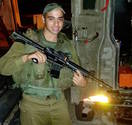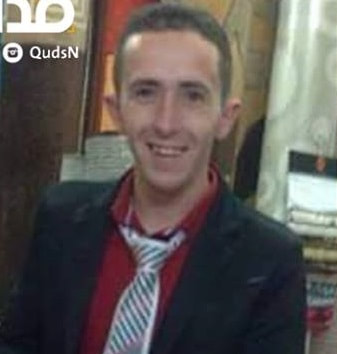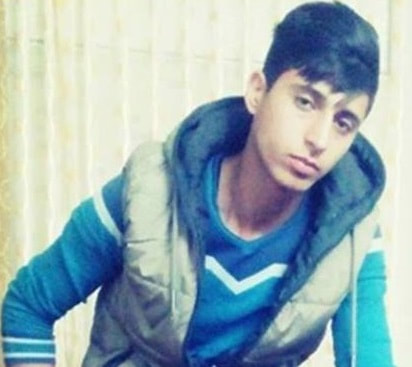11 sept 2017
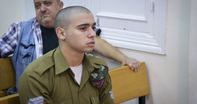
The Israeli army chief of staff said he would seriously consider easing the 18-month sentence of Elor Azaria, a soldier whose manslaughter conviction was upheld in a military court sometime earlier.
According to the Hebrew-speaking Channel 2, Israel’s Chief of Staff Gadi Eisenkot said reducing Azaria’s verdict does not entail that he would be acquitted.
In February, an Israeli military court in Tel Aviv issued a ruling of a manslaughter conviction and an 18-month prison sentence for Azaria, who, in March 2016, shot dead an incapacitated Palestinian anti-occupation youth who allegedly attempted to stab an Israeli soldier.
Immediately following the court’s announcement, politicians and public figures, including Prime Minister Benjamin Netanyahu and Defense Minister Avigdor Liberman, called for Azaria to be pardoned.
In his statement, Eisenkot said “if Azaria decides to file a request for a reduced sentence, it will be seriously considered, along with a review of the other considerations related to this case.”
On January 4, a military court found Azaria, who recently completed his military service, guilty of manslaughter. In addition to the 18-month sentence, the court also ruled that he would be demoted to private.
Speaking outside the courtroom at the Kirya military headquarters in Tel Aviv, chief prosecutor Lt. Col. Nadav Weissman pointed out that two courts, composed of eight different judges, all found Azaria guilty.
The divisive case had revealed deep rifts in Israeli society, with some seeing Azaria as a hero, while to others—the majority—he is a criminal.
According to the Hebrew-speaking Channel 2, Israel’s Chief of Staff Gadi Eisenkot said reducing Azaria’s verdict does not entail that he would be acquitted.
In February, an Israeli military court in Tel Aviv issued a ruling of a manslaughter conviction and an 18-month prison sentence for Azaria, who, in March 2016, shot dead an incapacitated Palestinian anti-occupation youth who allegedly attempted to stab an Israeli soldier.
Immediately following the court’s announcement, politicians and public figures, including Prime Minister Benjamin Netanyahu and Defense Minister Avigdor Liberman, called for Azaria to be pardoned.
In his statement, Eisenkot said “if Azaria decides to file a request for a reduced sentence, it will be seriously considered, along with a review of the other considerations related to this case.”
On January 4, a military court found Azaria, who recently completed his military service, guilty of manslaughter. In addition to the 18-month sentence, the court also ruled that he would be demoted to private.
Speaking outside the courtroom at the Kirya military headquarters in Tel Aviv, chief prosecutor Lt. Col. Nadav Weissman pointed out that two courts, composed of eight different judges, all found Azaria guilty.
The divisive case had revealed deep rifts in Israeli society, with some seeing Azaria as a hero, while to others—the majority—he is a criminal.
10 aug 2017

Former Israeli soldier Elor Azarya began his 18-month prison sentence on Wednesday, for the point-blank shooting and killing of a Palestinian in 2016 — after a last-minute attempt to postpone his incarceration.
Azarya was convicted of manslaughter and sentenced to a year and a half in prison, for shooting and killing 21-year-old Palestinian Abd al-Fattah al-Sharif as the disarmed Palestinian lay severely wounded on the ground, after allegedly committing a stabbing attack in the southern occupied West Bank city of Hebron, in March of 2016.
Azarya shot al-Sharif in the head, with a number of witnesses quoting him as saying, “This dog is still alive!” and “This terrorist deserves to die!” before he pulled the trigger.
According to Ma’an, Israeli media reported that dozens of Israelis gathered both outside of Azarya’s home in Ramla and in front of the military prison known as Prison Four, in central Israel, to show support for Azarya, who has been seen by many Israelis as an unjustly punished hero.
Israeli news outlet Ynet reported that the demonstrators’ slogans included “Elor is a hero!”, “Do not fear, Elor, Israel is with you!” and “If you don’t return the boy, we will overturn the state!”
Meanwhile, The Times of Israel said that Azarya held a party on Tuesday night, before heading to prison, during which Israeli pop song “Mother’s Hero” was played — a likely reference to the portrayal of Azarya as Israel’s son who was only doing his duty.
Israel’s shoot-to-kill policy has received widespread support among Israeli citizens, as a 2016 poll by the Israel Democracy Institute found that 47 percent of Jewish Israelis supported the sentiment that “any Palestinian who carries out a terror attack against Jews should be killed on the spot, even if he has been captured and clearly does not pose a threat.”
“This is a sad day for the state, for the (Israeli army) and for some 85 to 90 percent of the citizens of Israel,” The Times of Israel quoted Azarya’s lawyer Yoram Sheftel as saying on Wednesday.
“This is a day of happiness for the Arab enemy and, therefore, this a day of happiness for the Israeli media. Never before has a person gone to prison when so many citizens regret he is going to prison.”
Sheftel had requested, on Sunday, that Azarya’s prison sentence be postponed until Israeli army Chief of Staff Gadi Eisenkot ruled on whether to commute Azarya’s sentence to community service — a request that was rejected by the Israeli military court of appeals on Tuesday, Ynet reported.
The verdict confirming Azarya’s sentence, which was upheld by an appeals court in late July, will only become peremptory — final — on Sept. 7, meaning that Eisenkot could not grant Azarya’s request before then.
During the appeals process, Israeli judges highlighted that Azarya had “never expressed remorse or questioned his actions” as one of the main reasons for not lowering his sentence.
In addition to seeking a sentence reduction from Eizenkot, Azarya’s lawyers could also request a pardon from Israeli President Reuven Rivlin.
Azarya’s defense had argued that the young Israeli man has been unfairly targeted and that his sentencing represents a “selective enforcement of the law,” according to Human Rights Watch (HRW).
“Indeed, Human Rights Watch has repeatedly documented the fact that the problem is not the conduct of a single soldier, but an atmosphere of immunity from punishment for illegally killing Palestinians,” the rights group said in June.
“Responsibility for upholding ethical and legal norms doesn’t rest solely on the shoulders of a single 20-year-old soldier, but also on the senior officials who sent him — and too many others — the wrong message regarding the use of deadly force.”
The case has been denounced as a “show trial” for focusing on the case to distract from a wider culture of impunity for Israeli forces, as Azarya was charged with manslaughter for what was termed by rights groups as an “extrajudicial execution” and by the victim’s family as “cold-blooded murder.”
Following the initial announcement of the 18-month sentence, the al-Sharif family had said that they were “not surprised” by the lenient sentence — noting that the soldier received less prison time than a Palestinian child would for throwing stones.
Azarya was the only member of Israeli forces to be charged with killing a Palestinian in 2016 — when at least 109 Palestinians were shot and killed by Israeli forces and settlers — according to Human Rights Watch.
According to rights group Yesh Din, of the 186 criminal investigations opened by the Israeli army into suspected offenses against Palestinians in 2015, just four yielded indictments.
Azarya was convicted of manslaughter and sentenced to a year and a half in prison, for shooting and killing 21-year-old Palestinian Abd al-Fattah al-Sharif as the disarmed Palestinian lay severely wounded on the ground, after allegedly committing a stabbing attack in the southern occupied West Bank city of Hebron, in March of 2016.
Azarya shot al-Sharif in the head, with a number of witnesses quoting him as saying, “This dog is still alive!” and “This terrorist deserves to die!” before he pulled the trigger.
According to Ma’an, Israeli media reported that dozens of Israelis gathered both outside of Azarya’s home in Ramla and in front of the military prison known as Prison Four, in central Israel, to show support for Azarya, who has been seen by many Israelis as an unjustly punished hero.
Israeli news outlet Ynet reported that the demonstrators’ slogans included “Elor is a hero!”, “Do not fear, Elor, Israel is with you!” and “If you don’t return the boy, we will overturn the state!”
Meanwhile, The Times of Israel said that Azarya held a party on Tuesday night, before heading to prison, during which Israeli pop song “Mother’s Hero” was played — a likely reference to the portrayal of Azarya as Israel’s son who was only doing his duty.
Israel’s shoot-to-kill policy has received widespread support among Israeli citizens, as a 2016 poll by the Israel Democracy Institute found that 47 percent of Jewish Israelis supported the sentiment that “any Palestinian who carries out a terror attack against Jews should be killed on the spot, even if he has been captured and clearly does not pose a threat.”
“This is a sad day for the state, for the (Israeli army) and for some 85 to 90 percent of the citizens of Israel,” The Times of Israel quoted Azarya’s lawyer Yoram Sheftel as saying on Wednesday.
“This is a day of happiness for the Arab enemy and, therefore, this a day of happiness for the Israeli media. Never before has a person gone to prison when so many citizens regret he is going to prison.”
Sheftel had requested, on Sunday, that Azarya’s prison sentence be postponed until Israeli army Chief of Staff Gadi Eisenkot ruled on whether to commute Azarya’s sentence to community service — a request that was rejected by the Israeli military court of appeals on Tuesday, Ynet reported.
The verdict confirming Azarya’s sentence, which was upheld by an appeals court in late July, will only become peremptory — final — on Sept. 7, meaning that Eisenkot could not grant Azarya’s request before then.
During the appeals process, Israeli judges highlighted that Azarya had “never expressed remorse or questioned his actions” as one of the main reasons for not lowering his sentence.
In addition to seeking a sentence reduction from Eizenkot, Azarya’s lawyers could also request a pardon from Israeli President Reuven Rivlin.
Azarya’s defense had argued that the young Israeli man has been unfairly targeted and that his sentencing represents a “selective enforcement of the law,” according to Human Rights Watch (HRW).
“Indeed, Human Rights Watch has repeatedly documented the fact that the problem is not the conduct of a single soldier, but an atmosphere of immunity from punishment for illegally killing Palestinians,” the rights group said in June.
“Responsibility for upholding ethical and legal norms doesn’t rest solely on the shoulders of a single 20-year-old soldier, but also on the senior officials who sent him — and too many others — the wrong message regarding the use of deadly force.”
The case has been denounced as a “show trial” for focusing on the case to distract from a wider culture of impunity for Israeli forces, as Azarya was charged with manslaughter for what was termed by rights groups as an “extrajudicial execution” and by the victim’s family as “cold-blooded murder.”
Following the initial announcement of the 18-month sentence, the al-Sharif family had said that they were “not surprised” by the lenient sentence — noting that the soldier received less prison time than a Palestinian child would for throwing stones.
Azarya was the only member of Israeli forces to be charged with killing a Palestinian in 2016 — when at least 109 Palestinians were shot and killed by Israeli forces and settlers — according to Human Rights Watch.
According to rights group Yesh Din, of the 186 criminal investigations opened by the Israeli army into suspected offenses against Palestinians in 2015, just four yielded indictments.
5 aug 2017

Medical sources have reported, on Friday evening, that at least three Palestinians were injured, when Israeli soldiers and colonist settlers assaulted many Palestinians in Jaber neighborhood, east of Hebron city, in the southern part of the West Bank. The soldiers also abducted a child, only twelve years of age, and a cameraman working for B’Tselem.
Several colonists, living in the illegal Keryat Arba’ colony, built on Palestinian lands east of Hebron, assaulted many Palestinians, and hurled stones at them, causing fractures in the arm of a Palestinian from Reb’ey family.
Meanwhile, Israeli soldiers fired rubber-coated steel bullets at the Palestinians, wounding two, identified as ‘Aref Jaber and Monir Jaber.
The soldiers also assaulted a child, identified as Ahmad Jaber, only twelve years of age, and abducted him.
Also in Hebron, the soldiers abducted an activist against Israeli colonies, and a cameraman working for the Israeli Information Center for Human Rights in the Occupied Territories (B’Tselem), identified as Emad Abu Shamsiyya, 40, in Tal Romeida neighborhood.
Abu Shamsiyya is the cameraman, who was repeatedly abducted and threatened by the soldiers after he filmed a soldier, identified as Elor Azaria, executing a wounded Palestinian, identified as Abdul-Fattah Sharif, near the Ibrahimi Mosque in Hebron.
Several colonists, living in the illegal Keryat Arba’ colony, built on Palestinian lands east of Hebron, assaulted many Palestinians, and hurled stones at them, causing fractures in the arm of a Palestinian from Reb’ey family.
Meanwhile, Israeli soldiers fired rubber-coated steel bullets at the Palestinians, wounding two, identified as ‘Aref Jaber and Monir Jaber.
The soldiers also assaulted a child, identified as Ahmad Jaber, only twelve years of age, and abducted him.
Also in Hebron, the soldiers abducted an activist against Israeli colonies, and a cameraman working for the Israeli Information Center for Human Rights in the Occupied Territories (B’Tselem), identified as Emad Abu Shamsiyya, 40, in Tal Romeida neighborhood.
Abu Shamsiyya is the cameraman, who was repeatedly abducted and threatened by the soldiers after he filmed a soldier, identified as Elor Azaria, executing a wounded Palestinian, identified as Abdul-Fattah Sharif, near the Ibrahimi Mosque in Hebron.
30 july 2017
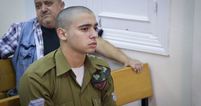
An Israeli military court of appeals upheld on Sunday the manslaughter conviction and 18-month prison sentence for Elor Azaria, the Israeli soldier convicted of shooting a downed Palestinian protester.
According to Hebrew-speaking media, the panel of judges handed down the ruling, which took more than two hours to read out.
The judges rejected the defense’s arguments and new information in its request to overturn the conviction, saying in the ruling that Azaria’s “manner was more suitable for a shooting range than the scene of a terror attack.” The judges also noted that Azaria never expressed remorse for his actions.
The judges also upheld the 18-month prison sentence, which the prosecution appealed saying it was too lenient.
Azaria came on the scene following an alleged anti-occupation stabbing in al-Khalil in the southern West Bank on March 24, 2016 by Abdel Fattah al-Sharif. The latter was shot while lying on the ground. Azaria shot him in the head in a shooting that was captured on video by a local resident for the Israeli human rights NGO B’Tselem.
Azaria was arrested the same day and indicted nearly a month later. Autopsy reports showed that the shots by Azaria killed Sharif.
Following the appeals court verdict, several Israeli government ministers called for Azaria to be pardoned, including Army Minister Avigdor Lieberman, Education Minister Naftali Bennett, and Sport and Culture Minister Miri Regev.
Israeli Prime Minister Benjamin Netanyahu also supported a pardon for Azaria, as he did in January following the original verdict. In a tweet following the verdict Netanyahu wrote: “My opinion has not changed on the question of granting a pardon to Elor Azaria, as I expressed it after the conviction in January. When the subject comes up during pardon deliberations, I will offer my recommendation for a pardon to the relevant authorities.”
In their ruling, the appeals court rejected Azaria’s testimony as untrustworthy, and found that he had shot the Palestinian from a desire for vengeance.
The conviction of the soldier has done little to assuage the anger of Palestinians over the case, many of whom have pointed to the 18-month sentence as far less than the mandatory minimum sentence for Palestinians who throw stones.
According to Hebrew-speaking media, the panel of judges handed down the ruling, which took more than two hours to read out.
The judges rejected the defense’s arguments and new information in its request to overturn the conviction, saying in the ruling that Azaria’s “manner was more suitable for a shooting range than the scene of a terror attack.” The judges also noted that Azaria never expressed remorse for his actions.
The judges also upheld the 18-month prison sentence, which the prosecution appealed saying it was too lenient.
Azaria came on the scene following an alleged anti-occupation stabbing in al-Khalil in the southern West Bank on March 24, 2016 by Abdel Fattah al-Sharif. The latter was shot while lying on the ground. Azaria shot him in the head in a shooting that was captured on video by a local resident for the Israeli human rights NGO B’Tselem.
Azaria was arrested the same day and indicted nearly a month later. Autopsy reports showed that the shots by Azaria killed Sharif.
Following the appeals court verdict, several Israeli government ministers called for Azaria to be pardoned, including Army Minister Avigdor Lieberman, Education Minister Naftali Bennett, and Sport and Culture Minister Miri Regev.
Israeli Prime Minister Benjamin Netanyahu also supported a pardon for Azaria, as he did in January following the original verdict. In a tweet following the verdict Netanyahu wrote: “My opinion has not changed on the question of granting a pardon to Elor Azaria, as I expressed it after the conviction in January. When the subject comes up during pardon deliberations, I will offer my recommendation for a pardon to the relevant authorities.”
In their ruling, the appeals court rejected Azaria’s testimony as untrustworthy, and found that he had shot the Palestinian from a desire for vengeance.
The conviction of the soldier has done little to assuage the anger of Palestinians over the case, many of whom have pointed to the 18-month sentence as far less than the mandatory minimum sentence for Palestinians who throw stones.
16 july 2017
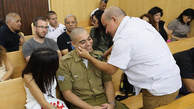
In light of Azaria's impending release from the IDF on Thursday, the IDF Court of Appeals is expected to place him under house arrest until an IDF judicial panel can rule on the appeals in the case; Azaria was convicted of manslaughter after shooting dead a neutralized terrorist.
For the first time since Sgt. Elor Azaria shot dead neutralized terrorist Abed al Fatah al-Sharif in Hebron in March 2016, the soldier will be released on house arrest.
Deputy Chief of the IDF Military Court of Appeals, Brig. Gen. Orly Markman, will deliberate on the terms of his house arrest ahead of Azaria's expected release from the IDF on Thursday.
Azaria—who was convicted of manslaughter and sentenced to 18 months in prison—will serve his house arrest at his parents' house in Ramla for no more than a week or two until a decision is reached on the appeals in the case.
Azaria has spent the last year in open detention at the Kfir Brigade's Nachshonim Base near Rosh HaAyin. In that time, Azaria periodically left the base for short furloughs home and many trips to court. Additionally, his family was granted frequent visitation rights to his base.
Military Prosecution is not expected to demand his transfer to full imprisonment as a civilian while there is still an appeal pending.
Azaria appealed the original verdict and demanded a full acquittal, while the prosecution appealed the leniency of the sentence and demanded that the court increase the punishment from 18 months to 24 months.
The judicial panel in the court of appeals originally asked the two sides to come to a compromise on their own. However, Azaria's attorney, Yoram Sheftel, and Prosecutor Lt. Col. Nadav Weissman could not reach an agreement.
For the first time since Sgt. Elor Azaria shot dead neutralized terrorist Abed al Fatah al-Sharif in Hebron in March 2016, the soldier will be released on house arrest.
Deputy Chief of the IDF Military Court of Appeals, Brig. Gen. Orly Markman, will deliberate on the terms of his house arrest ahead of Azaria's expected release from the IDF on Thursday.
Azaria—who was convicted of manslaughter and sentenced to 18 months in prison—will serve his house arrest at his parents' house in Ramla for no more than a week or two until a decision is reached on the appeals in the case.
Azaria has spent the last year in open detention at the Kfir Brigade's Nachshonim Base near Rosh HaAyin. In that time, Azaria periodically left the base for short furloughs home and many trips to court. Additionally, his family was granted frequent visitation rights to his base.
Military Prosecution is not expected to demand his transfer to full imprisonment as a civilian while there is still an appeal pending.
Azaria appealed the original verdict and demanded a full acquittal, while the prosecution appealed the leniency of the sentence and demanded that the court increase the punishment from 18 months to 24 months.
The judicial panel in the court of appeals originally asked the two sides to come to a compromise on their own. However, Azaria's attorney, Yoram Sheftel, and Prosecutor Lt. Col. Nadav Weissman could not reach an agreement.
28 may 2017
prosecutors’ demands by looking at other similar cases of Israeli soldiers who did not recieve harsh punishment for such acts.
The lawyer also said that Azaria was scared that the victim, AbdulFattah Al-Sharif, had an explosive belt and therefore had to shoot him dead immediately.
The graphic shooting video, which was filmed by a Palestinian cameraman from B’Tselem Israeli human rights group, went viral and sparked international rage.
The video shows Elor Azaria talking on the phone, then hanging up and stepping closer to Al-Sharif, and then shooting him in the head from a very close distance in the presence of Israeli ambulances.
The lawyer also said that Azaria was scared that the victim, AbdulFattah Al-Sharif, had an explosive belt and therefore had to shoot him dead immediately.
The graphic shooting video, which was filmed by a Palestinian cameraman from B’Tselem Israeli human rights group, went viral and sparked international rage.
The video shows Elor Azaria talking on the phone, then hanging up and stepping closer to Al-Sharif, and then shooting him in the head from a very close distance in the presence of Israeli ambulances.
30 mar 2017

Attorney Yoram Sheftel and Azaria's father
Five weeks after Elor Azaria sentenced to 18 months in prison for shooting and killing an incapacitated terrorist, efforts are now made on his behalf to reach an agreement with the prosecution that will finally put an end to the affair that has rocked the nation.
Moshe Israel, the lawyer who now represents Elor Azaria, is seeking a mutual withdrawal of the appeals filed by both the prosecution and Azaria's lawyer Yoram Sheftel against the soldier's 18-month sentence.
In a letter filed to the Military Advocate General by Israel, who was given power of attorney by Sheftel, the lawyer requested to open negotiations to reach the mutual withdrawal. The letter noted that it was sent with the knowledge and approval of Azaria and his family.
"I see great importance in reaching a quick agreement that would put an end to a storm that is rocking the country, the military, Azaria and his family," Israel told Yedioth Ahronoth, confirming that he was given power of attorney by Sheftel.
Sheftel's office also expressed willingness to come to an agreement between the two sides, stating that "since the Military Advocate General keeps hinting to the media that, if our appeal will be withdrawn, they will make sure to dramatically ease on Azaria in his serving of his sentence, we decided to do so if an offer by them is truly sent to us."
The Chief Justice of the Military Appeals Court, Maj. Gen. Doron Piles, will lead the judges' panel that will hear the two appeals in the Azaria case—the soldier's appeal's against his manslaughter conviction and the military prosecution's appeal of the lenient sentence given to Azaria.
Two non-military judges will also sit on the panel: Judge Yigal Plitman, who serves as the chief justice of the national labor court, and Judge Zvi Segal of the Jerusalem District Court.
Two IDF officers who are not jurists will complete the panel: Maj. Gen. (res.) Eyal Eizenberg, who served in his last role as the GOC Home Front Command, and Brig. Gen. Avi Peled, the former commander of the Golani Brigade.
Five weeks after Elor Azaria sentenced to 18 months in prison for shooting and killing an incapacitated terrorist, efforts are now made on his behalf to reach an agreement with the prosecution that will finally put an end to the affair that has rocked the nation.
Moshe Israel, the lawyer who now represents Elor Azaria, is seeking a mutual withdrawal of the appeals filed by both the prosecution and Azaria's lawyer Yoram Sheftel against the soldier's 18-month sentence.
In a letter filed to the Military Advocate General by Israel, who was given power of attorney by Sheftel, the lawyer requested to open negotiations to reach the mutual withdrawal. The letter noted that it was sent with the knowledge and approval of Azaria and his family.
"I see great importance in reaching a quick agreement that would put an end to a storm that is rocking the country, the military, Azaria and his family," Israel told Yedioth Ahronoth, confirming that he was given power of attorney by Sheftel.
Sheftel's office also expressed willingness to come to an agreement between the two sides, stating that "since the Military Advocate General keeps hinting to the media that, if our appeal will be withdrawn, they will make sure to dramatically ease on Azaria in his serving of his sentence, we decided to do so if an offer by them is truly sent to us."
The Chief Justice of the Military Appeals Court, Maj. Gen. Doron Piles, will lead the judges' panel that will hear the two appeals in the Azaria case—the soldier's appeal's against his manslaughter conviction and the military prosecution's appeal of the lenient sentence given to Azaria.
Two non-military judges will also sit on the panel: Judge Yigal Plitman, who serves as the chief justice of the national labor court, and Judge Zvi Segal of the Jerusalem District Court.
Two IDF officers who are not jurists will complete the panel: Maj. Gen. (res.) Eyal Eizenberg, who served in his last role as the GOC Home Front Command, and Brig. Gen. Avi Peled, the former commander of the Golani Brigade.
7 mar 2017
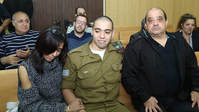
Following decision by the soldier himself to appeal his conviction, the Military Advocate General decides to appeal 18-month sentence; Azaria was convicted of manslaughter after shooting dead a wounded Palestinian terrorist in Hebron.
The Military Advocate General on Tuesday filed an appeal against the lenient sentence given to IDF soldier Elor Azaria, who was convicted of manslaughter after shooting dead a wounded Palestinian terrorist in Hebron.
"The proseuction will argue that according to the law, the respondent (Azaria) should receive a harsher sentence, and his punishment should be 36 to 60 months, or the punishment determined by the minority opinion at the military court (30 months)," the appeal stated.
The military court sentenced Azaria to 18 months in prison, with a majority of two judges. The minority opinion held by the third judge argued to hand out a much harsher sentence. The 18-months sentence is half of what the prosecution demanded—no less than three years.
"The ruling fails to continue on the important path paved by the verdict," the military prosecution wrote in its appeal. "The respondent received a lenient sentence that is not in line with his actions and the severity of these actions, is not in line with the level of punishment common in similar cases, and furthermore, is not in line with the level of punishment common in less severe cases.
"The court itself considered the respondent's actions gravely, placing them at the highest level of severity. In its sentencing, the court should have expressed the important moral, public and social message that must be taught to IDF soldiers and society at large."
The appeal went on to note that: "In its verdict, the military court delivered a decisive and clear message about the sanctity of life and the purity of arms, and emphasized that the needless killing of a person, even if he is a terrorist, is illegal, morally wrong and goes against the IDF's values."
Initially, the military prosecution was leaning towards settling for the lenient sentence as it came alongside a harsh conviction. But Azaria's own appeal of his sentence, alongside the resignation of most of his defense team, led the prosecution to reconsider.
Three of Azaria's four lawyers—including leading counsel Besserglick, as well as Ilan Katz and Karmit Scheiber—tended their resignation last week after the soldier and his family decided to appeal the sentence against the advice of the three litigators, who favored asking to mitigate his sentence or requesting pardon from the president.
Azaria's remaining lawyer, Yoram Sheftel, leveled harsh accusations against the Military Advocate General, claiming that Brig. Gen. Sharon Afek "threateningly blackmailed" the defense time.
"What led to the dramatic change in the position of the other litigators was a meeting with the head military prosecutor on Sunday, in which we were told 'if you don't file an appeal, neither will the IDF,'" Sheftel claimed in a press conference on Wednesday.
He attacked the tit-for-tat proposal, saying, "This is an outrageous assertion with a moral aspect—threats and extortion."
Sheftel appealed the manslaughter conviction on behalf of Azaria last week, claiming there was evidence the judges had allegedly ignored, as well as claiming the investigation by the IDF's Criminal Investigation Division (CID) was biased in a way that established the suspicions against Azaria.
The Military Advocate General on Tuesday filed an appeal against the lenient sentence given to IDF soldier Elor Azaria, who was convicted of manslaughter after shooting dead a wounded Palestinian terrorist in Hebron.
"The proseuction will argue that according to the law, the respondent (Azaria) should receive a harsher sentence, and his punishment should be 36 to 60 months, or the punishment determined by the minority opinion at the military court (30 months)," the appeal stated.
The military court sentenced Azaria to 18 months in prison, with a majority of two judges. The minority opinion held by the third judge argued to hand out a much harsher sentence. The 18-months sentence is half of what the prosecution demanded—no less than three years.
"The ruling fails to continue on the important path paved by the verdict," the military prosecution wrote in its appeal. "The respondent received a lenient sentence that is not in line with his actions and the severity of these actions, is not in line with the level of punishment common in similar cases, and furthermore, is not in line with the level of punishment common in less severe cases.
"The court itself considered the respondent's actions gravely, placing them at the highest level of severity. In its sentencing, the court should have expressed the important moral, public and social message that must be taught to IDF soldiers and society at large."
The appeal went on to note that: "In its verdict, the military court delivered a decisive and clear message about the sanctity of life and the purity of arms, and emphasized that the needless killing of a person, even if he is a terrorist, is illegal, morally wrong and goes against the IDF's values."
Initially, the military prosecution was leaning towards settling for the lenient sentence as it came alongside a harsh conviction. But Azaria's own appeal of his sentence, alongside the resignation of most of his defense team, led the prosecution to reconsider.
Three of Azaria's four lawyers—including leading counsel Besserglick, as well as Ilan Katz and Karmit Scheiber—tended their resignation last week after the soldier and his family decided to appeal the sentence against the advice of the three litigators, who favored asking to mitigate his sentence or requesting pardon from the president.
Azaria's remaining lawyer, Yoram Sheftel, leveled harsh accusations against the Military Advocate General, claiming that Brig. Gen. Sharon Afek "threateningly blackmailed" the defense time.
"What led to the dramatic change in the position of the other litigators was a meeting with the head military prosecutor on Sunday, in which we were told 'if you don't file an appeal, neither will the IDF,'" Sheftel claimed in a press conference on Wednesday.
He attacked the tit-for-tat proposal, saying, "This is an outrageous assertion with a moral aspect—threats and extortion."
Sheftel appealed the manslaughter conviction on behalf of Azaria last week, claiming there was evidence the judges had allegedly ignored, as well as claiming the investigation by the IDF's Criminal Investigation Division (CID) was biased in a way that established the suspicions against Azaria.

